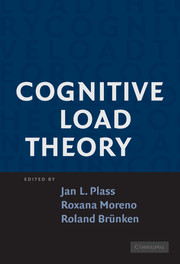Crossref Citations
This Book has been
cited by the following publications. This list is generated based on data provided by Crossref.
Robinson, Daniel
2010.
Editor’s Note: Remembering Roxana Moreno.
Educational Psychology Review,
Vol. 22,
Issue. 4,
p.
363.
Nehm, Ross H.
2010.
Understanding Undergraduates’ Problem-Solving Processes.
Journal of Microbiology & Biology Education,
Vol. 11,
Issue. 2,
p.
119.
Kalet, AL.
Song, H.S.
Sarpel, U.
Schwartz, R.
Brenner, J.
Ark, T.K.
and
Plass, J.
2012.
Just enough, but not too much interactivity leads to better clinical skills performance after a computer assisted learning module.
Medical Teacher,
Vol. 34,
Issue. 10,
p.
833.
Nasehi, Seyed Mehdi
Sillito, Jonathan
Maurer, Frank
and
Burns, Chris
2012.
What makes a good code example?: A study of programming Q&A in StackOverflow.
p.
25.
Hartjes, Laurie B.
and
Baumann, Linda C.
2012.
Evaluation of a Web-Based Malaria Risk Reduction Game for Study Abroad Students.
Journal of American College Health,
Vol. 60,
Issue. 5,
p.
403.
Durning, Steven J.
LaRochelle, Jeffrey
Pangaro, Louis
Artino, Anthony R.
Boulet, John
van der Vleuten, Cees
Hemmer, Paul
Denton, Dodd
and
Schuwirth, Lambert
2012.
Does the Authenticity of Preclinical Teaching Format Affect Subsequent Clinical Clerkship Outcomes? A Prospective Randomized Crossover Trial.
Teaching and Learning in Medicine,
Vol. 24,
Issue. 2,
p.
177.
Andrade, Allen D.
Cifuentes, Pedro
Mintzer, Michael J.
Roos, Bernard A.
Anam, Ramanakumar
and
Ruiz, Jorge G.
2012.
Simulating Geriatric Home Safety Assessments in a Three-Dimensional Virtual World.
Gerontology & Geriatrics Education,
Vol. 33,
Issue. 3,
p.
233.
Johnson, Benny G.
and
Slayter, Erik
2012.
Impact of Structure of Early Practice on Student Performance in Transaction Analysis.
Issues in Accounting Education,
Vol. 27,
Issue. 1,
p.
101.
Durning, Steven J.
Artino, Anthony R.
Boulet, John R.
Dorrance, Kevin
van der Vleuten, Cees
and
Schuwirth, Lambert
2012.
The impact of selected contextual factors on experts’ clinical reasoning performance (does context impact clinical reasoning performance in experts?).
Advances in Health Sciences Education,
Vol. 17,
Issue. 1,
p.
65.
Skiles, Michaela D
and
Howarth, Jeffrey T
2012.
From Signs to Minds: Spatial Information Design and Mental Maps.
The Cartographic Journal,
Vol. 49,
Issue. 4,
p.
312.
Agrawal, Rakesh
Chakraborty, Sunandan
Gollapudi, Sreenivas
Kannan, Anitha
and
Kenthapadi, Krishnaram
2012.
Empowering authors to diagnose comprehension burden in textbooks.
p.
967.
Spinath, Birgit
Hasselhorn, Marcus
Artelt, Cordula
Köller, Olaf
Möller, Jens
and
Brünken, Roland
2012.
Gesellschaftliche Herausforderungen für Bildungsforschung und -praxis.
Psychologische Rundschau,
Vol. 63,
Issue. 2,
p.
92.
Sung, Eunmo
and
Mayer, Richard E.
2012.
Students' beliefs about mobile devices Vs. desktop computers in South Korea and the United States.
Computers & Education,
Vol. 59,
Issue. 4,
p.
1328.
Takir, Aygil
and
Aksu, Meral
2012.
The Effect of an Instruction Designed by Cognitive Load Theory Principles on 7th Grade Students’ Achievement in Algebra Topics and Cognitive Load.
Creative Education,
Vol. 03,
Issue. 02,
p.
232.
Lin, Tao
Li, Xiao
Wu, Zhiming
and
Tang, Ningjiu
2013.
Automatic Cognitive Load Classification Using High-Frequency Interaction Events.
International Journal of Technology and Human Interaction,
Vol. 9,
Issue. 3,
p.
73.
Uribe-Flórez, Lida J.
and
Trespalacios, Jesús
2013.
Cases on Digital Game-Based Learning.
p.
400.
Schwartz, Ruth N.
Milne, Catherine
Homer, Bruce D.
and
Plass, Jan L.
2013.
Pedagogic Roles of Animations and Simulations in Chemistry Courses.
Vol. 1142,
Issue. ,
p.
43.
Warburton, Edward C.
Wilson, Margaret
Lynch, Molly
and
Cuykendall, Shannon
2013.
The Cognitive Benefits of Movement Reduction.
Psychological Science,
Vol. 24,
Issue. 9,
p.
1732.
Jones, Allen R.
2013.
Increasing Adult Learner Motivation for Completing Self-Directed E-Learning.
Performance Improvement,
Vol. 52,
Issue. 7,
p.
32.
Suits, Jerry P.
and
Sanger, Michael J.
2013.
Pedagogic Roles of Animations and Simulations in Chemistry Courses.
Vol. 1142,
Issue. ,
p.
1.



